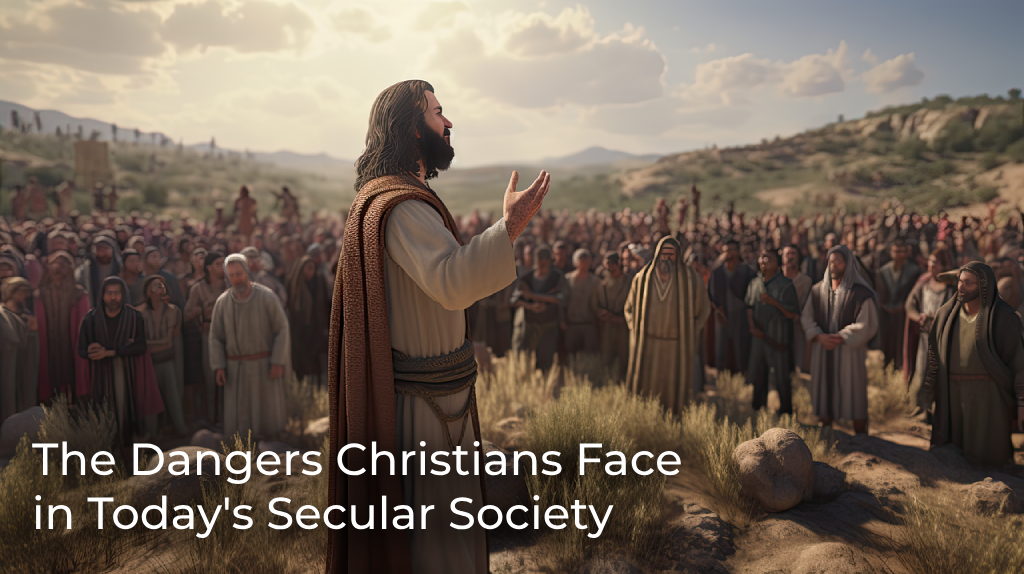
If you were of the world, the world would love you as its own; but because you are not of the world, but I chose you out of the world, therefore the world hates you. Remember the word that I said to you: ‘A servant is not greater than his master.’ If they persecuted me, they will also persecute you. If they keep my word, they will also keep yours.”
– John 15:19-20 [ESV]
In the 21st Century, secularism has become a dominant force in many parts of the world. While secularism itself is not inherently against any one single religion, its rise has brought about challenges for many Christians, as traditional Biblical beliefs counter secular humanism head-on in many ways. As society becomes more secular, Christians often find themselves navigating a world that is increasingly indifferent or even hostile to their beliefs. Here are some of the dangers Christians face in today’s secular society:
Marginalization of Christian Values
As secular values have become the de facto mainstream paradigm, Christian principles can be thrown to the sidelines. This can manifest in various ways, from the removal of religious symbols in public spaces and the downplaying of Christian holidays to the complete removal of Christian thought in entertainment and the media.
Misunderstandings and Stereotypes
With decreasing exposure to Christian teachings, many people may develop misconceptions about the faith. This can lead to stereotypes, where Christians are seen as out-of-touch, judgmental, or even bigoted. The decline in religious education and the rise of secularism mean that many people may not have a comprehensive understanding of Christian teachings. This lack of knowledge can lead to misconceptions about what Christians believe and why they believe it.
Pop culture, including movies, TV shows, social media, and music, has a significant influence on shaping perceptions. Often, Christian characters in media are portrayed in a one-dimensional manner, either as overly pious individuals or as hypocrites. This narrow portrayal can reinforce stereotypes and prevent people from seeing the multifaceted nature of Christian believers. It’s crucial to recognize that these portrayals are fictional and often exaggerated for dramatic effect, and they don’t represent the vast majority of Christians.
In any community, there are always individuals or groups with extreme views that can overshadow the majority’s beliefs. In Christianity, vocal minorities might emphasize a particular doctrine or interpretation, which can then be mistakenly seen as representative of all Christians. This can lead to broad generalizations and further deepen misunderstandings. It’s essential to differentiate between the views of a minority and the more solid biblical beliefs held within, the wider Christian community.
Pressure to Conform
In a secular society, there can be significant pressure on Christians to conform to secular norms, especially in areas like sexuality, gender issues, marriage, and the sanctity of human life. This can lead to internal conflicts for many believers who are trying to reconcile their faith while still trying to remain “relevant” and fit into today’s changing society.
Legal and Social Discrimination
In some cases, Christians may face legal challenges for adhering to their beliefs. For instance, Christian business owners might be sued for refusing to provide services that go against their religious convictions. Additionally, in some professions, expressing Christian beliefs can lead to ostracization or even job loss.
Beyond these legal implications, there’s also a growing social trend where expressing Christian values, especially on controversial topics, can lead to backlash on social media platforms. This digital age discrimination can result in personal attacks, doxing, or even organized campaigns to boycott a Christian individual’s business or profession. Such intense scrutiny and potential for public shaming can deter many from openly discussing or practicing their faith, leading to a silent suppression of religious expression.
Diminishing Religious Freedom
While many secular societies champion the idea of freedom of expression, this freedom can sometimes be curtailed regarding religious beliefs. There have been instances where Christians have been penalized for expressing their beliefs, especially if they are deemed “politically incorrect.”
As societies evolve and new norms emerge, the line between acceptable religious expression and perceived intolerance can become blurred. This can lead to situations where laws or regulations, originally intended to protect minority rights or maintain social harmony, inadvertently restrict the free practice and expression of Christian beliefs. Over time, these restrictions can create a chilling effect, where Christians may feel hesitant to participate in public discourse or openly practice their faith for fear of legal repercussions or societal backlash.
Loss of Community
As society becomes more secular, many Christians may feel isolated or unsupported in their faith journey. The decline in church attendance in mainline churches and the rise of secular communities can make it challenging for Christians to find like-minded individuals. People who once professed strong beliefs may compromise to fit into the world or, worse yet, abandon their faith in Jesus altogether.
Internal Conflicts
That last point ties in with this one and may end up being its inevitable conclusion. The tension between secular values and Christian teachings can lead to internal conflicts for believers. Many Christians grapple with how to live out their faith authentically in a world that often seems at odds with their beliefs.
This internal struggle is not just philosophical but deeply personal. It can manifest in everyday decisions, such as how to approach relationships, career choices, or even entertainment preferences. For some, the pressure to conform to societal norms can lead to a crisis of faith, where they question the relevance and applicability of their beliefs in the modern world.
Ideally, this introspection, while challenging, can also be an opportunity for growth, leading to a deeper understanding and reaffirmation of one’s faith in the face of adversity. If you are a Christian and are facing this conflict, I would urge you to dig deeper into the Bible and your faith and allow God to mature you as a follower of Christ in this adversity.
The Bottom Line
While the rise of secularism presents challenges for Christians, it’s essential to remember that challenges also bring opportunities. These trials can strengthen one’s faith, foster a deeper understanding of one’s beliefs, and create avenues for meaningful dialogue with those outside the faith. By understanding and addressing these dangers head-on, Christians can navigate today’s secular society with grace, conviction, and hope.

One Comment
Anna
mooi bericht , dank